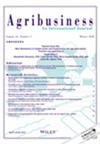The impact of the agricultural digital economy on China's agricultural export growth: Examining mechanisms from supply- and demand-side path perspectives
IF 2
3区 经济学
Q2 AGRICULTURAL ECONOMICS & POLICY
引用次数: 0
Abstract
The deep integration of the agricultural digital economy and foreign trade is an important driving force for promoting high–quality economic development. Based on a theoretical analysis of the impact mechanisms of the agricultural digital economy on agricultural exports, this study empirically examines the impact and mechanism of the agricultural digital economy on agricultural exports using Chinese agricultural export data from 2011 to 2016. The relevant findings are threefold. (1) The agricultural digital economy significantly enhances the growth of China's agricultural exports, and the result remains robust after a series of robustness tests. (2) The heterogeneity analysis reveals that the agricultural digital economy has a greater role in promoting exports from quality frontier firms, primary agricultural products and exports to developed countries. (3) The mechanism analysis demonstrates that the agricultural digital economy promotes exports of agricultural products on the supply side most strongly through quality–enhancing and the information cost effects, improving product quality and reducing information expenditure to achieve export growth. On the demand side, domestic demand traction and external–demand creation effects exert a local market effect and stimulate import market demand to promote export growth. [EconLit Citations: F746.12].农业数字经济对中国农产品出口增长的影响:从供给侧和需求侧路径视角考察机制
农业数字经济与对外贸易的深度融合是推动经济高质量发展的重要动力。本研究在对农业数字经济对农产品出口影响机制进行理论分析的基础上,利用2011年至2016年中国农产品出口数据,实证检验了农业数字经济对农产品出口的影响和机制。相关结论有三方面。(1)农业数字经济显著促进了中国农产品出口的增长,经过一系列稳健性检验,结果依然稳健。(2)异质性分析表明,农业数字经济对优质前沿企业出口、初级农产品出口和对发达国家出口的促进作用更大。(3)机理分析表明,农业数字经济在供给侧通过质量提升效应和信息成本效应对农产品出口的促进作用最大,提高产品质量和减少信息支出实现出口增长。在需求侧,内需牵引效应和外需创造效应发挥本地市场效应,刺激进口市场需求,促进出口增长。[经济学引文:F746.12]。
本文章由计算机程序翻译,如有差异,请以英文原文为准。
求助全文
约1分钟内获得全文
求助全文
来源期刊

Agribusiness
农林科学-食品科技
CiteScore
5.50
自引率
6.20%
发文量
58
审稿时长
6 months
期刊介绍:
Agribusiness: An International Journal publishes research that improves our understanding of how food systems work, how they are evolving, and how public and/or private actions affect the performance of the global agro-industrial complex. The journal focuses on the application of economic analysis to the organization and performance of firms and markets in industrial food systems. Subject matter areas include supply and demand analysis, industrial organization analysis, price and trade analysis, marketing, finance, and public policy analysis. International, cross-country comparative, and within-country studies are welcome. To facilitate research the journal’s Forum section, on an intermittent basis, offers commentary and reports on business policy issues.
 求助内容:
求助内容: 应助结果提醒方式:
应助结果提醒方式:


